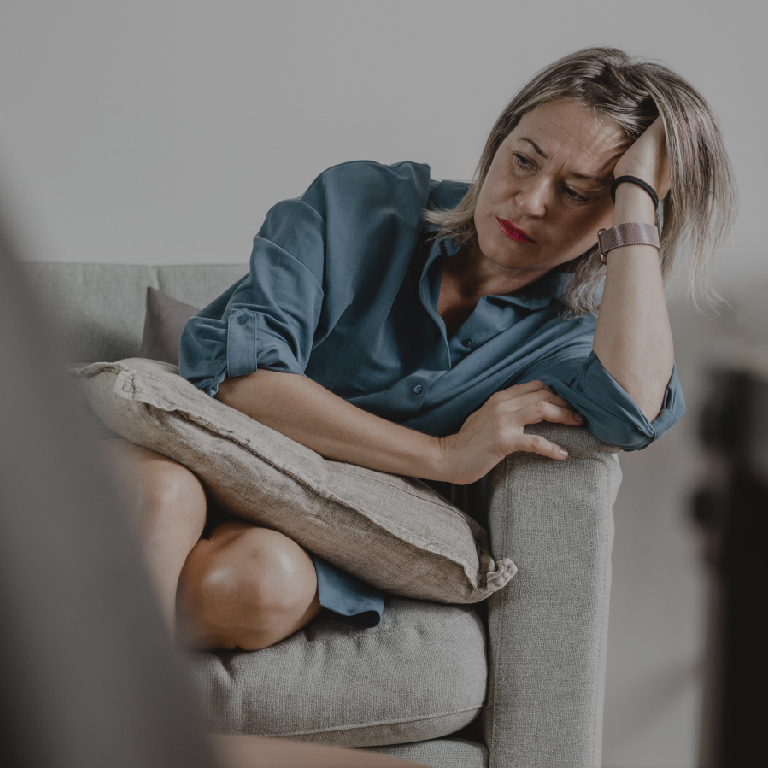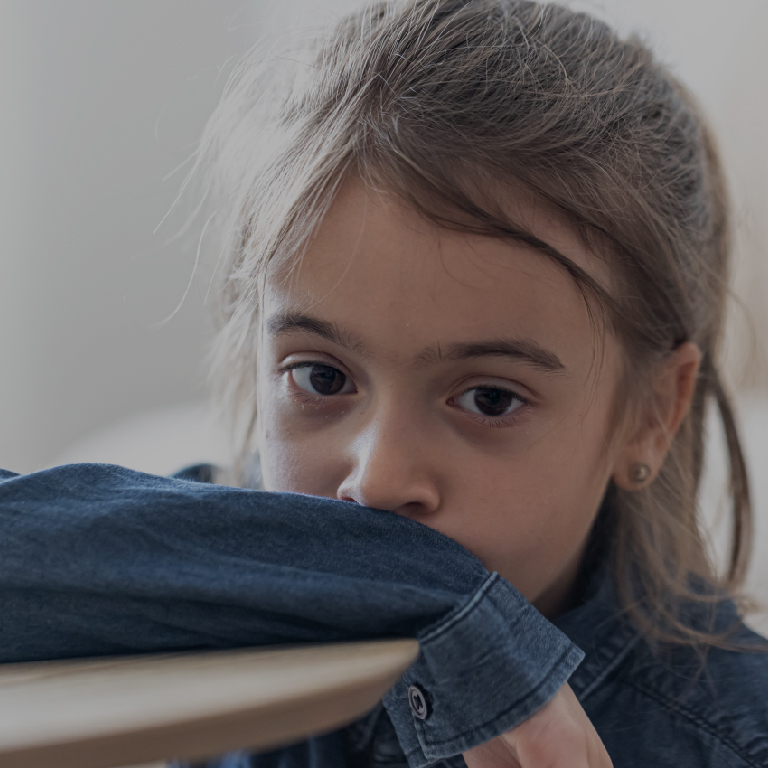We've all had those moments – you're about to make a big presentation at work, or maybe you're meeting your partner's family for the first time. Your heart races, palms get sweaty, and your mind races with 'what ifs.'
For many, these feelings come and go, but for others, they linger, indicating a deeper underlying anxiety. It’s important to remember that anxiety is a 100% normal human emotion, but it can become a problem when it's excessive or persistent.
In this article, we'll delve into how anxiety manifests itself in a variety of ways (physically, emotionally, behaviourally and cognitively), and what you can do to feel calmer.
Physical Symptoms of Anxiety and Calming Techniques
Anxiety is often thought of as a mental or emotional experience, but it also manifests itself in physical ways.
These physical symptoms are your body's way of responding to perceived threats, a primal instinct that helped us survive in times when danger was more common. Understanding these symptoms can help you manage them.
|
Symptom |
Description |
Calming Method
|
|
Rapid heartbeat |
When anxiety spikes, our heart rate increases
|
|
|
Shortness of breath
|
Common feeling of not catching one's breath |
Breathing exercises (especially focused on breathing through the belly) |
|
Trembling |
Jitters causing our body or hands to shake
|
Grounding techniques; holding an object or standing firm
|
|
Chest tightness |
Feeling as though your chest is constricted |
|
|
Diarrhea |
Loose stools and urgency to have a bowel movement |
Peppermint or ginger tea; low FODMAP diet; regular relaxation; optimising gut health
|
By understanding the connection between these symptoms and anxiety, and armed with the above calming methods, you can better navigate the physical episodes of heightened stress or tension.
Sometimes anxiety-like symptoms have medical causes. Thyroid disorders (e.g., Graves’ disease), diabetes-related blood sugar swings, and other hormone imbalances can trigger palpitations, tremors, sleep issues, and mood changes. If these symptoms are persistent or accompanied by rapid weight changes, heat/cold intolerance, or menstrual/fertility changes, consider a medical evaluation – an endocrinology specialist can assess hormone health and coordinate treatment alongside therapy and self-help tools.
Emotional Symptoms of Anxiety and Calming Techniques
Anxiety isn't solely a physical experience; its tentacles often reach deep into our emotional wellbeing. Understanding these emotional reactions and having strategies on hand can empower you to manage these feelings effectively.
|
Emotional Response |
Description |
Calming Method
|
|
Excessive worry
|
Persistent, intrusive thoughts about various aspects of daily life |
Therapy techniques (CBT, ACT, DBT, etc.) |
|
Feelings of impending doom
|
Overwhelming sensation that something terrible is about to happen |
|
|
Nervousness
|
Constant unease or restlessness
|
|
|
Irritability
|
Reduced tolerance leading to easily getting annoyed or angered |
Daily mindfulness; meditation; brief physical activity |
|
Sadness
|
Feelings of unhappiness or grief, sometimes without a clear cause |
Engage in activities that bring joy; practice gratitude or positive emotions journaling |
|
Fear
|
Anticipation of a specific threat or danger, real or imagined |
Positive visualization or exposure therapy techniques |
Recognising these emotional symptoms as manifestations of anxiety and equipping oneself with the right calming tools can pave the way for a more resilient and balanced emotional state.
How Anxiety Affects Us Behaviourally
Anxiety isn't just a state of mind or a fleeting emotion, it also alters our behaviours. It manifests in our behaviour in various ways, influencing how we act, react, and interact with our environment and the people around us. By being mindful of these behavioural shifts (perhaps supported with the techniques of a trained therapist), one can navigate through anxiety's ebbs and flows with greater control.
8 Common Behaviours Associated With Anxiety
- Avoidance behaviour. One of the most common behavioral responses to anxiety is avoidance. This means that people will deliberately avoid situations or places that make them feel anxious. For example, someone with social anxiety might decline party invitations, while someone with agoraphobia might avoid crowded places.
- Restlessness. People with anxiety often find it hard to sit still. They may pace around a room, fidget, or appear generally uneasy.
- Compulsive behaviours. In an attempt to manage their anxiety, some people might engage in repetitive or compulsive behaviours, such as constant hand washing or checking things multiple times. While these actions might provide temporary relief, they often become a cycle that can intensify anxiety in the long run.
- Withdrawal from social activities. Engaging with others can become challenging for those dealing with anxiety. This can lead to self-imposed isolation, where individuals withdraw from social gatherings, activities they once enjoyed, or even everyday situations like work or school.
- Irritability. People with anxiety are often on edge, leading to a decreased tolerance for frustrations. This can make them more irritable or quick to anger, even in situations that might seem minor to others.
- Increased dependence on safety behaviours. These are actions that a person believes reduce their anxiety, but they might not necessarily be helpful. For example, always having someone accompany them to places.
- Difficulty making decisions. The fear of making the "wrong" choice can paralyze someone with anxiety. They might agonize over decisions, big or small, fearing negative outcomes or judgments.
- Sleep disturbances. Anxiety can severely disrupt sleep patterns. This might manifest as insomnia, frequent waking throughout the night, or nightmares. A consistent lack of restorative sleep can further exacerbate anxiety symptoms.
In essence, the behavioural effects of anxiety are profound and can significantly impact a person's quality of life, relationships, and daily functioning. Recognising these behaviours is the first step towards seeking appropriate interventions and coping strategies.
How Anxiety Affects Us Cognitively
Anxiety doesn't just affect our behaviours. It can also have a profound impact on our thoughts, perception, and decision-making. Here are 10 of the most common ways anxiety affects us cognitively.
- Rumination. This is the tendency to dwell on negative thoughts and stories. People with anxiety may find themselves repeatedly thinking about the same things, even when there's no need to. This can be very draining. Research suggests that rumination is a root cause of both anxiety and depression symptoms, which is why the first step of our self-guided Mental Wellbeing Toolkit is designed to address this.
- Difficulty concentrating. Anxiety can make it hard to focus on tasks or conversations. This is because the mind is constantly racing with thoughts and worries.
- Catastrophic thinking. This is the tendency to jump to the worst possible conclusion. People with anxiety may often see danger where there is none. For example, they might worry that a simple headache is a sign of a serious illness.
- Memory issues. Anxiety can affect memory retention and recall. This is because the brain is so focused on worry that it doesn't have the capacity to store new information.
- Indecisiveness. Anxiety can make it difficult to make decisions. This is because people with anxiety are often afraid of making the wrong choice. They may worry about the consequences of their decisions, even if they're minor.
- Distorted perception of reality. Anxiety can cause people to perceive situations as more threatening or negative than they actually are. This is because the brain is in a state of hyperarousal, which makes it more likely to interpret things as threatening.
- Black and white thinking. This is the tendency to see things in absolute terms, such as "always" or "never." It’s also called "splitting". People with anxiety may use this type of thinking to avoid uncertainty.
- Hypervigilance. This is the tendency to be constantly on alert for danger. People with anxiety may be constantly scanning their environment for threats, even when there are none. This can be exhausting and make it difficult to relax.
- Self-doubt and low self-esteem. Anxiety can erode a person's confidence. People with anxiety may constantly doubt their abilities, decisions, and self-worth.
- Fixation on perceived threats. Even when there's no immediate danger, people with anxiety may be fixated on potential threats. This can make it difficult to focus on the present moment or enjoy life.
The cognitive effects of anxiety can be particularly debilitating. They can make it hard to function at work, school, or in relationships. The good news is that there are many different ways to address these issues. Therapy, especially cognitive behavioural therapy (CBT), can be effective in helping people with anxiety learn to manage their thoughts and behaviours.
Summary
Lots of people experience anxiety, and there are many ways to reduce it.
The first step is to recognize that you're struggling with anxiety. Once you've acknowledged and accepted your anxiety, you can start to learn more about it and how to manage it.
Remember, dear reader, it's okay to seek help for anxiety. We all need a guiding hand now and then. Life can be incredibly challenging, and navigating through the twists and turns can sometimes feel overwhelming.
Whether it's talking to a friend, reaching out to a therapist, or exploring self-help tools, remember that you have plenty of options to explore.
It's important to be patient with yourself. It takes time to learn how to manage anxiety. Don't give up if you don't see results immediately. Just keep working at it, and eventually you’ll succeed.
A Toolkit to Help You Reduce Anxiety
Research shows that self-help materials are often enough for people to overcome mild to moderate mental health difficulties without professional support.
Our self-guided program includes tools from CBT, DBT, ACT and more, so you can discover what works best for you. Check out The Mental Wellbeing Toolkit today – it's "like 10 therapy sessions in one."

About Megan
With over 15 years as a nationally certified LPCC, Megan Corrieri specializes in addressing anxiety and other mental health challenges. Her extensive experience covers therapy for individuals and couples facing issues like depression and sexual addiction. In this article, Megan delves into the cognitive effects of anxiety, using her vast expertise to illuminate the topic.Megan owns and operates NorthStar Counseling & Therapy, a private practice located in Frisco, TX.



